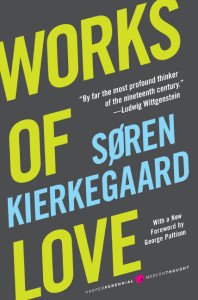 Works of Love
Works of Love
By Søren Kierkegaard
My rating: 4 of 5 stars
Works of Love is a searching exploration of the distinctive and demanding character of Christian love. It is not a “feel good” book but one that might leave you wondering whether you really have loved at all, or loved well.
Kierkegaard begins with the paradox of love’s character as both hidden and yet bearing fruit in works of love. He then explores the great command to love neighbor as oneself. He plumbs the challenges of loving a neighbor in all the ways we love ourselves, and the fact that it is the neighbor we are to love, literally anyone, and not just the friend or the lover.
He then considers how love is the fulfillment of the law, seen most fully in how Christ fulfilled the law. The law is always indeterminate-we can never know if we’ve met all its demands, but if we love as Christ, we can be sure of this. He also introduces here an idea also found in Bonhoeffer that God is the middle term between us and the person we love. We love others in God and to God. And so also, this is how we love with a clear conscience. We first are transparent with God, and so then with the neighbor we love.
Perhaps even more challenging is to love those we see. We are not to look for those who are lovable but to love those in our sight apart from anything “deserving in them”. But it doesn’t stop there. Kierkegaard’s chapter on the debt of love argues that this is a debt that is never discharged toward another person as long as we live. We can never say we have loved “enough”.
He turns to 1 Corinthians 13 and takes this phrase by phrase. He talks about love building up and, in this, love presupposes the love of the other, that is we upbuild others by presupposing the best in them. Love believes all things, that is it believes, and persists in believing the best of others. It isn’t self protective and thus never truly deceived. Similarly, love hopes all things, is always hopeful of the good in another. Love never seeks its own because there is no “mine” in love. Love hides a multiplicity of sins because this is not what it is looking for, and even when this is unavoidable responds in forgiveness. Love abides and never knows the breaking of a relationship because love keeps loving.
His concluding chapters explore the character of mercy, the nature of reconciliation, and something I’ve never seen before, an exploration of love in the remembering of the dead, a love that cannot be reciprocated and is therefore the freest love. His concluding chapter truly sums everything up in the idea of “like unto like”. We love and we believe we are loved, we forgive (or not) as we believe we are forgiven. We either live in a world of judgment where we judge others and live under the fearsome judgment of God, or we believe the God of love and forgiveness in Christ and live in that love and forgiveness toward others. Hence, the works of love really are an expression of faith.
If this summary of the book seems a bit ‘dense’ or even perplexing, this probably reflects the book’s character. Kierkegard leaves no stone unturned in his exploration of love. This is a book to be read slowly and perhaps repeatedly and only if one is willing to wrestle with the uncomfortable challenge of what it truly means to practice Christian love. Perhaps this is implicit in Kierkegaard but all this is fact an impossibility apart from Christ’s indwelling fullness. This isn’t simply a more demanding ethic, but one that leads us first to repentance of how poorly we have loved and casts us back onto the empowering presence of God’s Spirit. In every sense then, this is a hard book, but because of that, all the more worthwhile.
Thank-you to Bob for sharing Review: Works of Love from his blog Bob on Books. A reality worth giving attention to when reflecting upon the gift of the Christ child — in particular as many of us are not only surrounded by family, but also with dreams/thoughts of a new year (which I confess are too hard for me to set aside). ~ Thomas B. Grosh IV, Associate Director, Emerging Scholars Network
Bob Trube is Associate Director of Faculty Ministry and Director of the Emerging Scholars Network. He blogs on books regularly at bobonbooks.com. He resides in Columbus, Ohio, with Marilyn and enjoys reading, gardening, choral singing, and plein air painting.

Leave a Reply